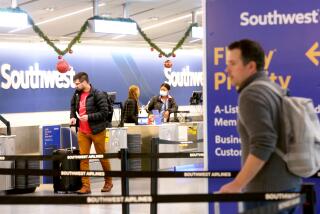Coping With Sudden Death: Air Fares Substantially High
Most travelers don’t think much about special emergency air fares until a loved one falls gravely ill. But nine of the 10 largest U.S. passenger airlines offer bereavement fares for travel within North America, and most also offer fares for those visiting critically ill members of their immediate family.
How much do those fares help? Many travelers are startled to discover that their emergency bereavement fare to Minneapolis or Pittsburgh or Atlanta is likely to cost them substantially more than their last vacation flight to the same place.
That’s because when most airlines set their emergency discount rates, they don’t use the low-priced restricted fares that are most familiar to leisure travelers who heed advance-purchase restrictions. Instead, most airlines say they are now setting their bereavement and medical-emergency rates at about 50% of the costliest unrestricted coach fare (also known as a “full fare coach” ticket). (Trans World Airlines, which says it usually waves advance-purchase requirements in bereavement cases, appears to be an exception.)
Travelers frequently can beat bereavement fares simply by asking for lowest available fare without an advance-purchase requirement, or by calling smaller, no-frills airlines that have relatively low walk-up fares. Among the possibilities: Pan Am, American Trans Air (ATA) and Southwest Airlines, which is the only major carrier without a bereavement policy, but offers walk-up fairs that undercut its competitors’ bereavement fares on many routes.
Another surprise that may await an emergency traveler is that the airline industry hasn’t made up its mind about what to do for unmarried domestic partners. Though America West, USAir, American and United airlines have changed policies in recent years to include such partners among those who qualify for bereavement or medical-emergency discounts, other carriers have not, including Alaska, Continental, Delta, Northwest and TWA.
Most airlines extend bereavement and medical-emergency fares to immediate family, grandparents and grandchildren, aunts and uncles, nieces and nephews, also including stepparents, stepchildren and step-siblings, along with parents-in-law, children-in-law and siblings-in-law. Policies vary when it comes to cousins, great-grandparents and other non-immediate family members.
Here is an overview of bereavement and medical-emergency fares offered within North America by nine major U.S. carriers. Airlines may ask for written evidence of a traveler’s relationship to a critically ill or deceased person, and some, including America West and Alaska, may ask to see a copy of the death certificate. In addition, airlines may ask for phone numbers of a doctor, medical facility or funeral director who can confirm facts. Most carriers require that travel begin within seven days of booking of a bereavement ticket; Northwest’s limit is three days; some, including Alaska and America West, have no specific requirement. Travelers should always check with specific carriers for details.
Alaska spokesman Jack Evans said the carrier offers bereavement fares that vary widely, and says it decides medical-emergency requests on a case-by-case basis. On flights departing today between LAX and Anchorage, Alaska’s prices were $1,402 for unrestricted full fare coach, $790 for the bereavement fare, and $218 for the cheapest restricted ticket. (These fares can fluctuate daily, as can all the fares cited in this article. For an up-to-the-minute fare, travelers need to contact an airline or travel agent directly.)
An America West spokesman said the carrier offers bereavement fares (but not medical-emergency fares) at discounts that differ depending on the cities involved. Between LAX and Phoenix, January fares were $438 for the costliest unrestricted walk-up ticket, $138 for a bereavement fare, or $58 for the cheapest restricted fare.
American Airlines spokesman Tim Smith said the carrier offers bereavement and medical-emergency fares, usually set at 50% of the price of the costliest full fare coach ticket. For instance, on American’s flights today between Dallas-Fort Worth and LAX, the unrestricted full fare round-trip coach ticket would have been $1,332. The bereavement fare: $666. The lowest possible restricted fare was $198.
Many travelers are startled to discover that their emergency bereavement fare is likely to cost them more than their last vacation.
Continental offers bereavement and medical-emergency fares (labeled “compassion fares”), usually at 50% of its costliest full fare coach ticket price. For instance, on one of today’s Continental LAX-Houston flights, the full fare coach ticket would have run $1,360. A bereavement fare: $681. The cheapest restricted fare: $268.
Delta spokesman Todd Clay said the carrier offers both types of emergency fares (which it calls “death or imminent death” fares) at 50% of a full fare coach ticket’s cost. For instance, most of Delta’s January flights between LAX and Atlanta ran $1,137 for a full fare round-trip coach ticket, which means $568.50 in bereavement and medical-emergency cases. The cheapest restricted fare was $302.
Northwest spokesman Jim Faulkner said the carrier offers bereavement and medical-emergency fares at 30% of the price of a full fare coach ticket. For instance, most of Northwest’s January flights from LAX to Minneapolis run $2,098 for a full fare round-trip coach ticket, or $629.40 in bereavement and medical-emergency cases. The cheapest restricted round-trip fare was $396.
TWA spokesman John McDonald said the carrier offers bereavement and medical-emergency fares, and usually gives emergency travelers the fare they would have been able to get if they had met advance-purchase requirements. For instance, he said, a TWA traveler between LAX and St. Louis today would have faced an unrestricted full fare coach price of $1,586. The cheapest restricted fare was $198. The TWA bereavement fare would have been $198.
United spokeswoman Mary Jo Holland said the carrier generally offers bereavement fares at about 50% of the price of a full fare coach ticket, and considers medical-emergency requests on a case-by-base basis. A reservationist reported that on a round-trip ticket beginning today between Chicago and LAX, United’s full fare coach price would be $1,700. Its bereavement fare: $971. The restricted fare: $198.
A USAir spokesman said the carrier offers both bereavement and medical-emergency fares (which it added last year), generally at 50% of full fare coach rates. For instance, most of USAir’s January flights between LAX and Pittsburgh run $1,632 for an unrestricted round-trip full fare coach ticket, or $816 in bereavement and medical-emergency cases. The cheapest restricted fare: $528.
Reynolds travels anonymously at the newspaper’s expense, accepting no special discounts or subsidized trips. He welcomes comments and suggestions, but cannot respond individually to letters and calls. Write Travel Insider, Los Angeles Times, Times Mirror Square, Los Angeles 90053 or e-mail chris.reynolds@latimes.com.
More to Read
Sign up for The Wild
We’ll help you find the best places to hike, bike and run, as well as the perfect silent spots for meditation and yoga.
You may occasionally receive promotional content from the Los Angeles Times.







